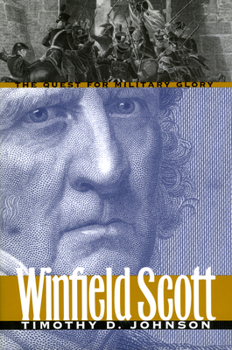Winfield Scott: The Quest for Military Glory
Select Format
Select Condition 
Book Overview
One of the most important public figures in antebellum America, Winfield Scott is known today more for his swagger than his sword. "Old Fuss-and-Feathers" was a brilliant military commander whose tactics and strategy were innovative adaptations from European military theory; yet he was often under appreciated by his contemporaries and until recently overlooked by historians. While John Eisenhower's recent Agent of Destiny provides a solid summary of Scott's remarkable life, Timothy D. Johnson's much deeper critical exploration of this flawed genius should become the standard work. Thoroughly grounded in an essential understanding of nineteenth-century military professionalism, it draws extensively on unpublished sources in order to reveal neglected aspects of Scott's life, present a more complete view of his career, and accurately balance criticism and praise. Johnson dramatically relates the key features of Scott's career: how he led troops to victory in the War of 1812 and the Mexican War, fought against the Seminoles and Creeks, and was instrumental in professionalizing the U.S. Army, which he commanded for two decades. He also tells how Scott tried to introduce French methods into army tactical manuals, and how he applied his study of the Napoleonic Wars during the Mexico City Campaign but found European strategy of little use against Indians. Johnson further suggests that Scott's creation of an officer corps that boasted Grant, Lee, McClellan and other veterans of the Mexican War raises important questions about his influence on Civil War generalship. More than a military history, this book tells how Scott's aristocratic pretensions placed him at odds with emerging notions of equality in Jacksonian America and made him an unappealing politician in his bid for the presidency. Johnson not only recounts the facets of Scott's personality that alienated nearly everyone who knew him but also reveals the unsavory methods he used to promote his career and the scandalous ways he attempted to relieve his lifelong financial troubles. Although his legendary vanity has tarnished his place among American military leaders, Scott is shown to have possessed great talent and courage. Johnson's biography offers the most balanced portrait available of Scott by never losing sight of the whole man.
Format:Paperback
Language:English
ISBN:0700621067
ISBN13:9780700621064
Release Date:June 2015
Publisher:University Press of Kansas
Length:328 Pages
Weight:1.00 lbs.
Dimensions:0.8" x 5.9" x 8.9"














